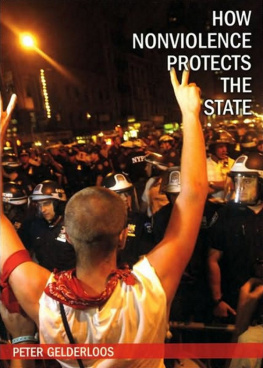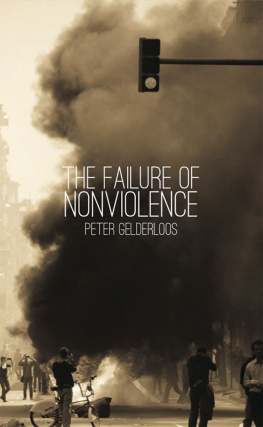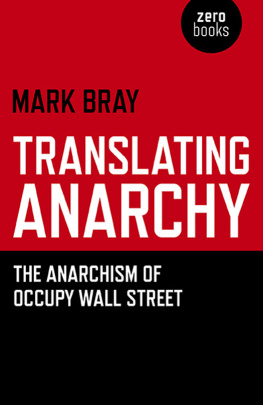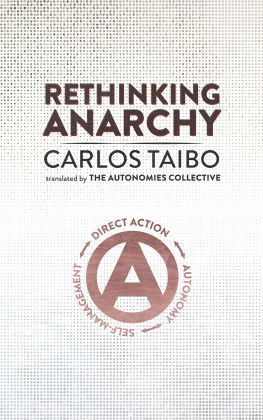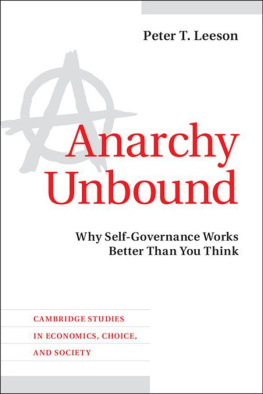Peter Gelderloos
Anarchy Works

2010
The Anarchist Library
No more talk about the old days, its time for something great.
I want you to get out and make it work...
Thom Yorke
Dedicated to the wonderful people of RuinAmalia, La Revoltosa, and the Kyiv infoshop, for making anarchy work.
Although this book started out as an individual project, in the end a great many people, most of whom prefer to remain anonymous, helped make it possible through proofreading, fact-checking, recommending sources, editing, and more. To acknowledge only a small part of this help, the author would like to thank John, Jose, Vila Kula, aaaa!, L, J, and G for providing computer access throughout a year of moves, evictions, crashes, viruses, and so forth. Thanks to Jessie Dodson and Katie Clark for helping with the research on another project, that I ended up using for this book. Also thanks to C and E, for lending their passwords for free access to the databases of scholarly articles available to university students but not to the rest of us.
* * * * *
There are hidden stories all around us,
growing in abandoned villages in the mountains
or vacant lots in the city,
petrifying beneath our feet in the remains
of societies like nothing weve known,
whispering to us that things could be different.
But the politician you know is lying to you,
the manager who hires and fires you,
the landlord who evicts you,
the president of the bank that owns your house,
the professor who grades your papers,
the cop who rolls your street,
the reporter who informs you,
the doctor who medicates you,
the husband who beats you,
the mother who spanks you,
the soldier who kills for you,
and the social worker who fits your past and future into a folder in a filing cabinet
all ask
WHAT WOULD YOU DO WITHOUT US?
It would be anarchy.
* * * * *
And the daughter who runs away from home,
the bus driver on the picket line,
the veteran who threw back his medal but holds on to his rifle,
the boy saved from suicide by the love of his friends,
the maid who must bow to those who cant even cook for themselves,
the immigrant hiking across a desert to find her family on the other side,
the kid on his way to prison because he burned down a shopping mall they were building over his childhood dreams,
the neighbor who cleans up the syringes from the vacant lot, hoping someone will turn it into a garden,
the hitchhiker on the open road,
the college dropout who gave up on career and health insurance and sometimes even food so he could write revolutionary poetry for the world,
maybe all of us can feel it:
our bosses and tormentors are afraid of what they would do without us,
and their threat is a promise
the best parts of our lives are anarchy already.
Anarchy Would Never Work
Anarchism is the boldest of revolutionary social movements to emerge from the struggle against capitalism it aims for a world free from all forms of domination and exploitation. But at its heart is a simple and convincing proposition: people know how to live their own lives and organize themselves better than any expert could. Others cynically claim that people do not know what is in their best interests, that they need a government to protect them, that the ascension of some political party could somehow secure the interests of all members of society. Anarchists counter that decision-making should not be centralized in the hands of any government, but instead power should be decentralized: that is to say, each person should be the center of society, and all should be free to build the networks and associations they need to meet their needs in common with others.
The education we receive in state-run schools teaches us to doubt our ability to organize ourselves. This leads many to conclude anarchy is impractical and utopian: it would never work. On the contrary, anarchist practice already has a long record, and has often worked quite well. The official history books tell a selective story, glossing over the fact that all the components of an anarchist society have existed at various times, and innumerable stateless societies have thrived for millennia.
How would an anarchist society compare to statist and capitalist societies? It is apparent that hierarchical societies work well according to certain criteria. They tend to be extremely effective at conquering their neighbors and securing vast fortunes for their rulers. On the other hand, as climate change, food and water shortages, market instability, and other global crises intensify, hierarchical models are not proving to be particularly sustainable. The histories in this book show that an anarchist society can do much better at enabling all its members to meet their needs and desires.
The many stories, past and present, that demonstrate how anarchy works have been suppressed and distorted because of the revolutionary conclusions we might draw from them. We can live in a society with no bosses, masters, politicians, or bureaucrats; a society with no judges, no police, and no criminals, no rich or poor; a society free of sexism, homophobia, and transphobia; a society in which the wounds from centuries of enslavement, colonialism, and genocide are finally allowed to heal. The only things stopping us are the prisons, programming, and paychecks of the powerful, as well as our own lack of faith in ourselves.
Of course, anarchists do not have to be practical to a fault. If we ever win the freedom to run our own lives, well probably come up with entirely new approaches to organization that improve on these tried and true forms. So let these stories be a starting point, and a challenge.
What exactly is anarchism?
Volumes have been written in answer to this question, and millions of people have dedicated their lives to creating, expanding, defining, and fighting for anarchy. There are countless paths to anarchism and countless beginnings: workers in 19th century Europe fighting against capitalism and believing in themselves instead of the ideologies of authoritarian political parties; indigenous peoples fighting colonization and reclaiming their traditional, horizontal cultures; high school students waking up to the depth of their alienation and unhappiness; mystics from China one thousand years ago or from Europe five hundred years ago, Daoists or Anabaptists, fighting against government and organized religion; women rebelling against the authoritarianism and sexism of the Left. There is no Central Committee giving out membership cards, and no standard doctrine. Anarchy means different things to different people. However, here are some basic principles most anarchists agree on.
Autonomy and Horizontality: All people deserve the freedom to define and organize themselves on their own terms. Decision-making structures should be horizontal rather than vertical, so no one dominates anyone else; they should foster power to act freely rather than power over others. Anarchism opposes all coercive hierarchies, including capitalism, the state, white supremacy, and patriarchy.
Mutual Aid: People should help one another voluntarily; bonds of solidarity and generosity form a stronger social glue than the fear inspired by laws, borders, prisons, and armies. Mutual aid is neither a form of charity nor of zero-sum exchange; both giver and receiver are equal and interchangeable. Since neither holds power over the other, they increase their collective power by creating opportunities to work together.


